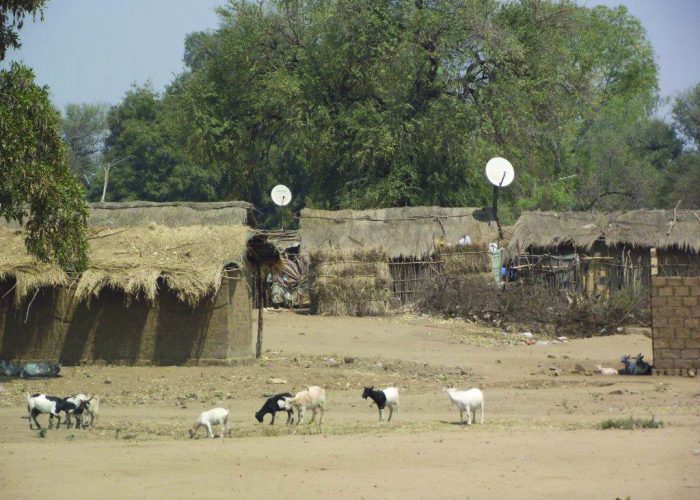


 DECADES of a monopoly and partisan programming by the state-owned Zimbabwe Broadcasting Corporation (ZBC) has forced millions of television viewers to look beyond the country’s borders for an alternative source of broadcasting content.
DECADES of a monopoly and partisan programming by the state-owned Zimbabwe Broadcasting Corporation (ZBC) has forced millions of television viewers to look beyond the country’s borders for an alternative source of broadcasting content.
It would appear that the entry of the Movement for Democratic Change (MDC) in 1999 onto the political stage might have forced ZBC to become rabid in its criticism of ZANU-PF’s rivals.
In a bid to deal with the new political threat, ZANU-PF propagandists turned to ZBC to do the party’s bidding.
Dealing with the MDC’s rise meant tightening the grip on the airwaves so that the opposing views are shut out completely.It was, however, the ordinary TV viewers who suffered the most from the war, as politicians battled to win the hearts and minds of the people.
The inception of stringent media laws in 2002, such as the Access to Information and Protection of Privacy Act and tougher broadcasting laws was the final straw. It made it near impossible for the entry of divergent media players.
Around the same time, government also attempted to shut out external influences from ZBC’s programming by advocating for “100 percent local content,” which became a buzzword at the time.
ZANU-PF jingles, talk shows on farming and one-sided political programmes bashing the West and the MDC became the order of the day at ZBC.
Fed up by ZBC’s partisan reportage and poor programming, viewers started looking for alternatives.
Initially, they found solace in Joy TV and Munhumutapa Broadcasting, but these channels did not last for long before the government pulled the plug on them.
But it was also not long before the free-to-air channels craze hit Zimbabwe, with viewers now being able to watch some of South African Broadcasting Corporation (SABC) channels from the comforts of their homes.
Those who can afford, are subscribing to MultiChoice Zimbabwe, which offers its Digital Satellite Television (DSTV) at a cost of between US$10 and US$75 per month.
Nearly all well-heeled members of the Zimbabwean society subscribe to MultiChoice, including government ministers.
An independent survey conducted by the Zimbabwe All Media Products Survey in November 2011 established that the country has nearly three million free-to-air decoders, representative of nearly a quarter of the national population estimated at 12 million.
The free-to-air decoders, despite their illegal transmission, offered an alternative view in the country. Programmes such as Generations, Muvhango and Isidingo gained cult-like following across the country.
Although, signal carrier Sentech earlier this month cut off the SABC signal, it seems ZBC’s excitement that it would regain viewers who had dumped it for years has been short-lived.
Despite being a more expensive option, pay television is gaining ground as viewers do whatever it takes to avoid a return to ZBC.
Officials at MultiChoice Zimbabwe say there has been an upsurge in new subscribers.
Desperate viewers who have been missing out on their regular SABC programmes due to the signal cuts are turning to purchasing DSTV decoders from South Africa and registering them in that country, while viewing from Zimbabwe.
The trend has been gaining ground and has seen officials at MultiChoice Zimbabwe distancing themselves from the illegal practice.
It is, however, the launch of 1st TV last Friday on the free-to-air decoders that has piled pressure on ZBC.
Vivid Gwede, a political commentator, said ZBC was bound to be affected by the new station because of its repulsive inclination to propaganda and overt political bias to one political voice and organisation.
“However, the impact of 1st TV will also depend on how the new player will handle itself and if it will prove to be a real alternative to viewers,” he said.
Rashweat Mukundu, the chairperson of the Zimbabwe Democracy Institute, said 1st TV would “shake” up the broadcasting sector in Zimbabwe.
“People will have access to an independent voice and another voice different from ZBC. The coming in of 1st TV is manifestation of the media policy failures of the State, which still believes in this day and age of technology that sovereignty is defined by a geographic territory, which they can close and open up as they wish. 1st TV is proving a point on how backward Zimbabwe’s media landscape is, moreso its lack of promoting an open broadcasting sector. If we had a genuine public broadcaster as well as multiple private television stations, then maybe 1st TV would not have seen light of day,” said Mukundu.
With less than a week before voting in the do-or-die national elections, the broadcast sector is fast becoming a space that all political parties need in order to reach out to potential voters and their constituencies.
Nigel Mugamu, a social commentator, said the launch of 1st TV just before the elections meant different things to the political parties.
“Any launch of any television station will affect ZBC. People will invariably compare the choices before them. With more travel and exposure to other television channels like SABC, people understand value and have been exposed to more quality and ZBC lacks that element clearly.”